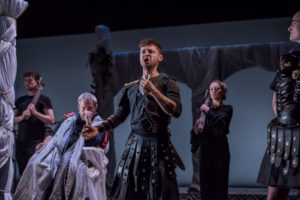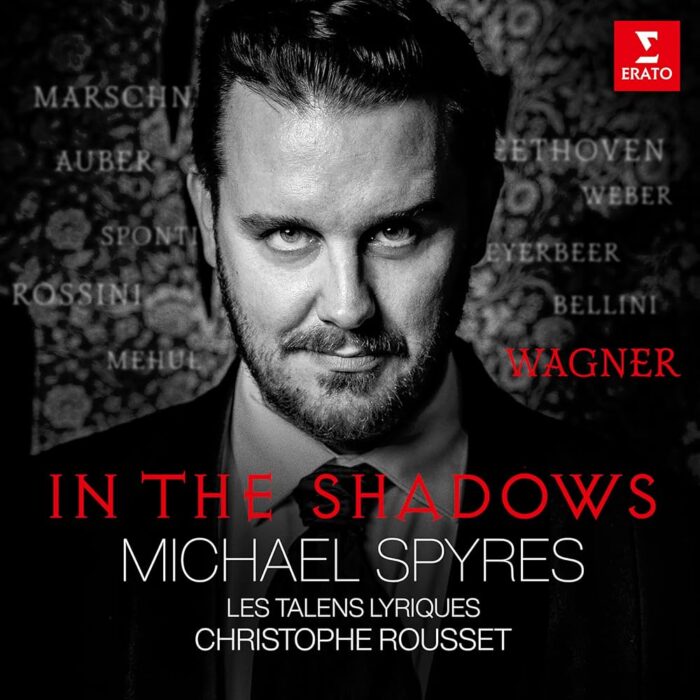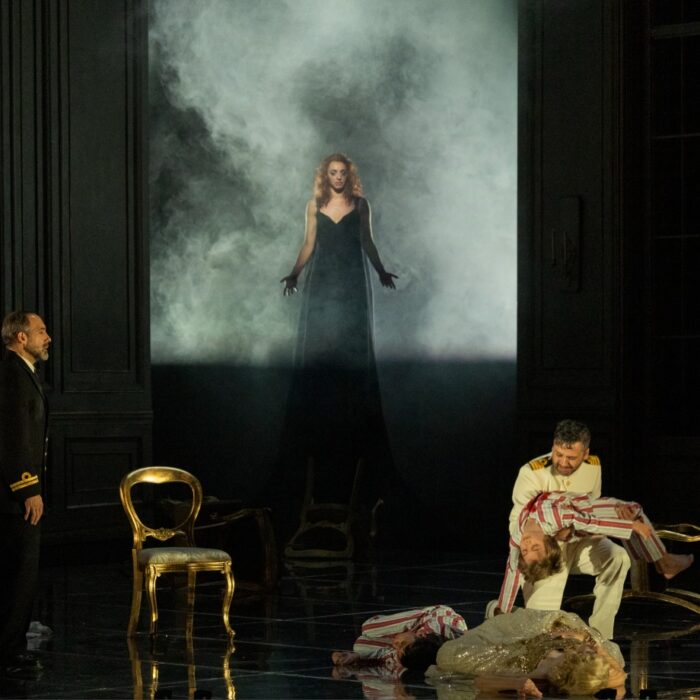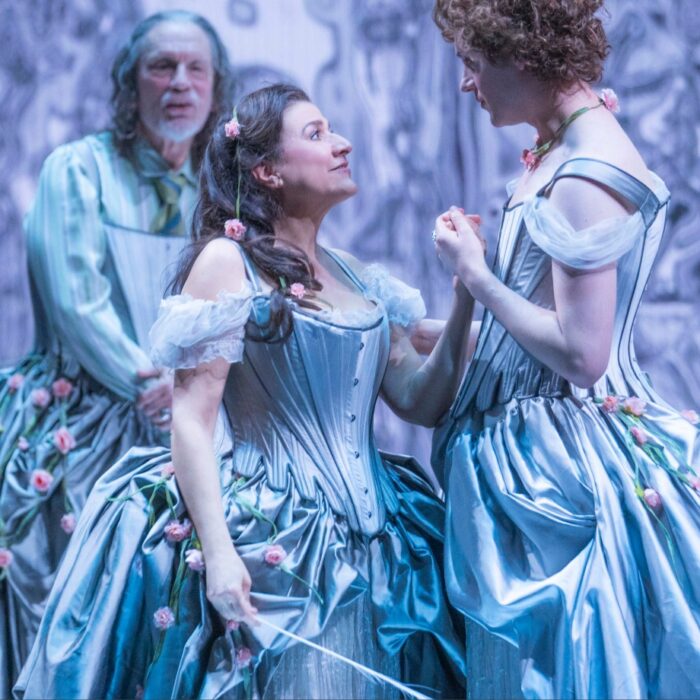
Buxton Festival 2019 Review: Lucio Papirio Dittatore
An Elegant Presentation Makes A Strong Case For Caldara’s Neglected Work
By Alan Neilson(Photo: Genevieve Girling)
Over the past 30 to 40 years baroque opera has undergone an enormous revival, with many forgotten works unearthed and brought back to life. Yet, it is still rare to come across an opera by the Venetian composer Antonio Caldara (1670–1736), who is now best remembered for his setting of the “Crucifixus.” During his lifetime, however, he was one of Europe’s most celebrated opera composers, appreciated by the likes of J.S.Bach and G.F.Telemann, with maybe as many as 90 titles to his name. He was a much travelled musician, acquiring posts in Venice, Mantua, Rome and Barcelona before ending up in Vienna as Vice-Kapellmeister to the Imperial Court of Charles VI.
The decision by Buxton Festival to stage “Lucio Papirio Dittatore,” premiered exactly 300 years ago in 1719, is therefore a welcome opportunity to view one of his works, which in collaboration with the baroque ensemble “La Serenissima” will be its first performance in modern times. Caldara remained in his post in Vienna from 1716 to 1736, and his staged works were usually written for celebratory occasions to glorify the Emperor, Charles VI.
“Lucio Papirio Dittatore” is such a work, and its plot can be read from this perspective, which places Lucio Papirio’s failings in stark contrast to Charles VI’s wise judgements, and in the process elevates the Habsburg Empire above that of Rome.
A Potent Story With A Mixed Production
In the plot, written by the great reforming librettist, Apostolo Zeno, the dictator Lucio Papirio struggles with a situation in which his son-in-law, Quinto Fabio, has disobeyed a direct order which forbade him to attack the enemy. He must now be punished, mainly because he actually won the battle.
Clearly, Quinto’s star cannot be allowed to shine more brightly than that of the dictator’s, but Lucio’s handling of the situation is poor, and it ends with the Senate condemning Quinto to death, a decision which Lucio regrets. However, trapped by his past decisions, he can do nothing to save his son-in-law’s life.
Eventually, after an unlikely set of fortuitous events, Quinto is pardoned, order is restored, and everyone celebrates Lucio’s rule, but it would have been clear to the original audience that Lucio is just not up to the standards of Charles VI.
The director, Mark Burns, and designer, Kitty Callister identified the conflict between freedom and control as the underlying driver of the narrative; Quinto’s freedom to make his own decisions about whether or not to engage in battle versus the control exercised from above by Lucio; or Lucio’s freedom to dispense justice in a way he feels to be correct, constrained by the values and inflexible laws that prevent him from doing what is right.
So far, so good! The result of this analysis, however, was a static staging which was fairly pleasing on the eye, namely a throne, a Roman column and couple of arches, wrapped in paper or cloth, which was supposed to expose the underlying conflict.
Those members of the audience au fait with the name Christo Vladimirov Javacheff, his work and its significance, will immediately understand the allusion. For those less well-versed in such matters, which, no doubt, include the overwhelming majority, it remained simply an elegant set, representing little more than Roman antiquity.
The costumes were graceful and classically inspired, but with one or two exceptions which were so ill-suited to the staging that they impacted beyond the importance of their characters and destroyed any sense of illusion. Moreover, they were aesthetically painful to behold, and their significance was obscure. Whereas Quinto and Cominio were attired in black Roman inspired military uniforms, the women in classical dresses, the Emperor in long flowing robes, Marco Fabio and Servilio could have walked in off the street, having just spent hours searching for the most insipid and boring clothes on offer.
Holding Our Attention
Musically, it was structured in a slightly more innovative way than a standard baroque opera, moving beyond the normal sequence of arias divided by recitatives, finishing with a laudatory chorus; instead it was fleshed out with ensemble and choral parts. Orchestrally, there was much larger use made of trumpets and timpani, which successfully reflected the military theme, and to an extent compensated for the, in parts, slow moving narrative.
Situated on its left-hand side, the “La Serenissma” ensemble shared the stage with the singers, giving it a semi-staged feel. Under the direction of its leader, Adrian Chandler, the ensemble produced a refined and elegant performance, and brought out the score’s many delights, not least its virtuosic aspects, foremost among them the violin playing of Chandler himself, whose playing really held the attention in what was an energetic and accomplished performance.
All the cast members gave committed, polished performances, in which the grace and elegance of the vocal lines were developed, although occasionally at the expense of the passions, but which were undoubtedly pleasing on the ear.
The title role of Lucio Papirio was played by tenor Robert Murray, who portrayed the inconsistent dictator, as heavy-handed, conflicted and frustrated, and without the necessary skills and personality for the job. Although he captured Lucio’s authority, he allowed it to veer off towards instability, providing his character with greater depth.
Vocally, Murray gave a forceful presentation. His singing was expressive, agile and secure and he imbued his recitatives with emotion; the scene in which he clashes with Quinto, one of the work’s high-points, was particularly successful, his rage and feeling of being slighted clearly exposed.
Countertenor Owen Willets, played the role of Quinto Fabio. His role has the most immediately appealing music, and Willets certainly took full advantage of the fact.
He has an interesting countertenor, with a colorful underside to the voice, which he used to burnish his phrases with an array of shades, which added significantly to his vocal characterization. There were plenty of opportunities for him to display his expressive coloratura, which was often urgent and impassioned. Throughout, Willet displayed ability to meet the emotional demands of the role, inflecting the vocal line with subtle ornamentation and well-placed emphases.
His love duet with Papiria, played by Rowan Pierce, was one of the numbers that caught the attention. The two voices combined beautifully, his bright countertenor complementing her pure-toned soprano, in what was an attractive and engaging piece. Pierce produced a delicate portrayal of Lucio’s daughter, who managed to combine her love for both Quinto, her husband and Lucio, her father, with the conflict she faced in trying to secure a pardon for Quinto, as general from Lucio, as dictator. She possesses a wonderfully clear, refined voice, and her cultivated phrasing captured Papiria’s sensitivities. Although her coloratura displayed agility and was elegantly delivered, it did not really take to the wing, lacking a little sparkle to fully convince.
Imposing Figures
Cominio, who is in love with Quinto’s sister, Rutilia, was parted by soprano Eleanor Dennis. She cut an imposing figure, dressed as a soldier, spear in hand, looking every inch like a Valkyrie. Her singing was strong and versatile, with careful attention given to the meaning of the text, notably so in her delivery of the recitatives. Phrasing was subtly developed, replete with well-placed inflections and pleasing embellishments, although possibly sounding a little too strident and monochromatic on occasions.
Soprano Elizabeth Karani, played the part of Rutilia. She made a strong impression in her aria, directed towards Servilio who was pursuing her, but for whom she only had hatred; it was expressively rendered, and displayed an attractive depth to the voice. She has a strong coloratura, and delivered her recitatives with versatility and purpose.
Countertenor William Towers, parted as Marco Fabio, was destined to struggle to make an impression, although through no fault of his own; his costume was dull and boring, his voice was less chromatic than Willets, his role was far less interesting, as was his music.
Nevertheless, he displayed quality; his voice possesses an attractive tone with a crystalline clarity, it is versatile, secure and refined, which he used skillfully to neatly embellish the vocal line and deliver an appealing coloratura.
In the role of Servilio was baritone Gareth Brynmor John, who also to suffered from bland costuming, and a part that really had little to capture the imagination. Nevertheless, he sang well, producing a solid performance, in which his intelligently crafted phrasing impressed.
If Caldara’s opera lacked the dramatic tension of the masterpieces produced by his contemporary Vivaldi, its music was no less appealing and engaging, and the musicians and singers certainly made a powerful case for further performances, and for taking a look at Caldara’s other long-neglected operas. The staging elevated the elegance of Caldara’s music, although its underlying concept passed by largely unnoticed.


